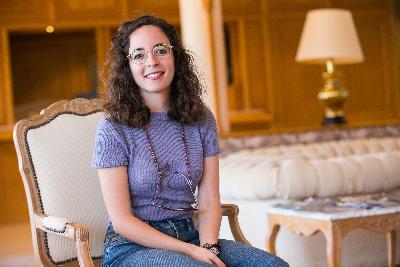Collective residencies / NEW JOURNALISM II / Olot
LAIA SERÓ
From Tuesday, 25 September 2018 to Sunday, 30 September 2018

Bio
From journalism to ethnography, Laia Seró approaches social topics from the point of view of documental literature. She studied Journalism at Universitat Autònoma de Barcelona (UAB) and a master’s degree in Anthropology and Ethnography at Universitat de Barcelona (UB). Recently, she has been in Argentina, where she has done a cronica workshop of Revista Anfibia and has explored in-depth issues like Historical Memory. Last years, she published at Metròpolis and Sàpiens magazines, and Ara newspaper; and has been the scriptwriter for «Lletrasonats» programme in Catalunya Radio. Nowadays, she is member of SomAtents magazine, where she writes and gives courses of journalism, ethnografy and media literacy. In 2016, in the literature festival Literal, she interviewed the 2015 Nobel Prize in Literature Svetlana Alexievich.
Project
During my stay at Faber I’m going to work in a project with SomAtents, the collective of journalistic action, with whom to develop some of the projects that we have in progress taking advantage of the stay at Faber (and I will take this opportunity to tell other residents and to return to the social environment of Olot if it is deemed appropriate). The journalists involved will participate in Retrats paral·lels photojournalistic project and the project to recover the collective memory of the Presó de dones. The whole group will also take advantage of this opportunity to hold a kick-off meeting in Olot.
How to approach the other
Two years ago, the journalist who is writing these lines began to explore the universe of etnography—the complex universe of meeting and understanding the other. My aim was to gain a better understanding of social sciences and its methodology in order to build stories with greater precison. Since then, I haven’t given up. The borders that separate both disciplines are blurry, but it’s always in this thin line were the best ideas are born. Everybody knows that the media industry is undergoing a serious crisis—one that affects its business model and the credibility of the press—, but why shouldn’t journalism and ethnography cross paths, considering their common interest for discovering reality and creating a story out of it.
This year, once again, I’ve attended the Faber residency. There I tried to navigate the complicated relationship between these two disciplines. I’ve been woriking on Dona’m la mar (Give me the sea / Give me your hand), an antropological and journalistic project which focuses on how women remain invisible in the Mediterranean. This research aims to bring the women who live in the sea to light in order to incorporate a gender perspective to Barcelona’s Maritime Museum.
The magazine of SomAtents is another space where I’m used to navigate the muddy waters of journalism and etnography. I’ve been a member of this group for the pasrt five years. From the very first day, it’s been a school to me (especially, a school of literary journalism). We continue to work on this project: and now, our goal is to launch a new magazine. What can we learn from the etnographic gaze of some journalists? And from literature? Let’s try it! Émile Zola’s work is full of etnographic material, and so are Anton Txejov’s writings… What about Tom Wolfe, or Gay Talese—how can we define their work, if not as examples of urban etnography?
